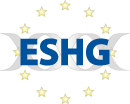In addition to the on-demand sessions listes below, all live sessions will be available on-demand as well within 24 hours after the session.
All on-demand content is accessible for registered participants from the start of the conference until November 1, 2021.
Always Available
Welcoming addresses by :
Maurizio Genuardi, President of the ESHG
Alexandre Reymond, Co-chair of the Scientific Programme Committee
Joris Veltman, Co-chair of the Scientific Programme Committee
View an outline of highlights of the day presented by an SPC member.
Always Available | Educational Sessions E03-E19
E03.1 The CANGEN-CANVAR Programme: Delivering better tools for prevention and early detection in hereditary cancer syndromes
Clare Turnbull
United Kingdom
E03.2 Boosting hereditary cancer research with the European Reference Network GENTURIS
Nicoline Hoogerbrugge;
The Netherlands
![]()
E04.1 How to think about uncertainty in clinical genomics
Paul Han;
United States
E04.2 Uncertainty: The experience of prospective parents
Stina Lou;
Denmark
E04.3 Coping with uncertainty of genomic testing in a non-genetic setting
Anthony Wierzbicki;
United Kingdom
E05.1 Genetic basis of imprinting disordes
Thomas Eggermann;
Germany
E05.2 Diagnosis and treatment of imprinting disorders
Karen Temple;
United Kingdom
E06.1 Pre-emptive pharmacogenetic testing in clinical practice
Jesse J. Swen;
The Netherlands
E06.2 Pharmacogenomics: Saving lives with personalized treatment
Jatinder Lamba;
United States
E07.1 Introduction to the arrhythmogenic disorders
Johan Saenen;
Belgium
E07.2 Inherited arrhythmia syndromes: Beyond monogenic inheritance
Connie R. Bezzina;
The Netherlands
E08.1 Using genomic resources to interpret the clinical significance of rare variants
Heidi Rehm;
United States
E08.2 Intepretation of the non-protein-coding regions of the genome
Nicky Whiffin;
United Kingdom
E09.1 Status of PGT and embryo selection in the era of NGS
Antonio Capalbo;
Italy
E09.2 Good practice recommendations for the PGT applications
Martine De Rycke;
Belgium
![]()
E10.1 AI in genomics: the present and the future
Julien Gagneur;
Germany
E10.2 Policy, ethical, legal and social issues of AI use in genomics
Sobia Raza ;
United Kingdom
E11.1 Polygenic risks in complex disorders and Covid-19
Angel Carracedo;
Spain
E11.2 Polygenic risks in disorders of aging
Valentina Escott-Price;
United Kingdom
E12.1 How are the causes of complex disease distributed in the human genome?
David Balding;
Australia
E12.2 Bayesian approaches for discovering the genetic aetiologies of rare diseases
Ernest Turro;
United Kingdom
E13.1 Deciphering liver regeneration cell-by-cell
Dominic Grün;
Germany
E13.2 A Studying the immune system cell by cell
Muzlifah Haniffa;
United Kingdom
E14.1 Epivariations in the human genome
Andrew Sharp;
United States
E14.2 Computational analysis of DNA methylation in disease
Kasper Hansen;
United States
E15.1 Signatures of selection in human genome
Aida Andres;
United Kingdom
E15.2 Genetic population structure and its consequences in biobank scale data
Daniel Lawson;
United Kingdom
E16.1 The mediatory role of DNA methylation in causal pathways
Rebecca Richmond;
United Kingdom
E16.2 Exploiting the genome-wide genetic architecture for causal modelling
Michel Nivard;
The Netherlands
E17.1 Chromosomal Instability and aging
Elsa Logarinho;
Portugal
E17.2 Genomic instability in early embryonic development
Ewart W. Kuijk;
The Netherlands
E18.1 What, when, and whys of genome-wide association studies (GWAS)
Marika Kaakinen;
United Kingdom
E18.2 Considerations for genotyping, quality control, and imputation in GWAS
Ayse Demirkan;
The Netherlands
E18.3 Population structure, meta-analysis and trans-ethnic meta-analysis in GWAS
Reedik Mägi;
Estonia
E19.1 Improving precision medicine for breast cancer in Africa
Jonine Figueroa;
United Kingdom
E19.2 Pediatric cancer/ Retinoblastoma management in Latinoamerica
Guillermo Luis Chantada
Spain
E19.3 Molecular profiling in cancer of African ancestry
John Carpten;
United States
Always Available | Workshops W12-W14
Workshop Organisers: Dieter Beule, Nadja Ehmke, Manuel Holtgrewe
About the workshop:
The workshop will discuss concepts and tools enabling more medical trained users in the analysis of whole exome variant data sets from individuals, families and cohorts. This year we focus on the challenges for clinical community to share and compare phenotypic and genotypic data.
Programme:
Introduction
Dieter Beule (BIH, Berlin, Germany)
From VCF to ClinVar Submission
Nadja Ehmke & Manuel Holtgrewe (Charité, Berlin, Germany)
Publishing & Sharing Clinical Variants in the Netherlands
Marielle van Gijn (UMCG Groningen and VKGL, The Netherlands)
Decipher as a resource for Clinical Exome Analysis
Julia Foreman (Wellcome Sanger Institute, Cambridge, UK)
Closing
Dieter Beule (BIH, Berlin, Germany)
Workshop Organiser: Kaitlin Samocha
About the workshop:
Although exome sequencing is now routinely available both for research and clinical purposes, the interpretation of identified variants remains a major challenge. In this workshop, we will address the technical, statistical, and biological considerations that need to be taken into account when interpreting variants from exome sequencing. In particular, we will present approaches to identify and interpret less-often studied types of variation (e.g. 5’ UTR variants), and illustrate their importance using real-life examples.
Programme:
Welcome and opening remarks
Kaitlin Samocha
Interpretation and understanding of 5’UTR variants
Xiaolei Zhang
Analysis and interpretation of RNA sequencing data in diagnostics of rare disorders
Holger Prokisch
Detection of mosaic chromosomal alterations in children with developmental disorders
Ruth Eberthardt
Workshop Organiser: Vita Dolzan
About the workshop:
Integration of pharmacogenomics (PGx) in the clinics has the potential to make pharmacotherapy safer and more effective by utilizing genetic patient data for drug dosing and selection. By utilizing examples from the real world clinical setting, the workshop aims to address burning questions related to implementation of PGx testing in clinical practice, with the emphasis on the available resources and approaches, that may be of interest for laboratory geneticists, clinical geneticists and clinicians.
Programme:
Introduction
Vita Dolzan, Slovenia
Pre-emptive pharmacogenetic testing: resources available
Jesse J. Swen, The Netherlands
Point-of care pharmacogenetic testing: resources available
William Newman, United Kingdom
Pharmacogenetic testing: Patient journeys and resources available to health care practitioners
Vita Dolzan, Slovenia


